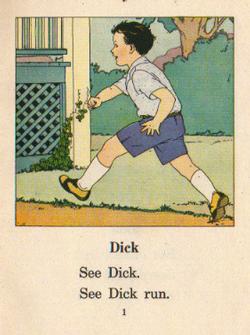JF Ptak Science Books Post 1277
 Words without Books–Kindle et al as a Dim Shadow in the History of Reading to Children The Kindle and its relatives may be a poor choice for reading to children–it’s a book and not a book, a collection of words without a wrapping, a constant reminder for what it isn’t, a cold remedy for warm memories.
Words without Books–Kindle et al as a Dim Shadow in the History of Reading to Children The Kindle and its relatives may be a poor choice for reading to children–it’s a book and not a book, a collection of words without a wrapping, a constant reminder for what it isn’t, a cold remedy for warm memories.
There have been a number of books “written” now that have no words. Elbert Hubbard charmingly put one together in 1898 (called Essay on Silence). More recently, there was The Nothing Book (1970), which was precisely that, and which found its way into the NYTimes book review section (“we have nothing to add”). Elsewhere in the arts John Cage produced a four and a half minute piece on nothing, while Samuel Beckett takes far less time to produce his ode to nothing in his play Breathing–all fine examples of nothing.
There are more-lesser examples of nothing in literature, with books produced using nothing but the letter “I”, or commas, or periods/dots, or plus/minus signs. They soberly add a little something to nothing and somehow come up with less than “something” and more than “nothing”, floating in a briney failed no-man’s-land of not-nothingness. Others have taken a different route around nothingness by simply dropping the use of a single letter in the formation of their novel–the lipogram isn’t even a stutter to nothingness, just a hollow something.
And that’s where the Kindle comes in, in the hollow somethingness.
Dick and Jane are something. Or at least the physicality of reading them to children is something. The stories aren’t important, really–the handling of the book, the feel of the pages, the jumbling of position, the steadying of the text, the turning of the pages, trying to navigate the swirl of motions, the feel of the whole thing as a voice deciphers the tracks along the pages.
It’s the act of reading that might be the most mportant thing in getting children to appreciate the whole idea of reading.
Reading from a Kindle just won’t do, it can’t accommodate the range of differences, the cascade of varying stimuli, that comes from holding a book. Books are always the same size inside a Kindle–I know t hat my own children love some books because of their shape, or they just like feeling something different in their own hands as they skip from title to title.
You also can’t give your kids the book that you had when you were little, seeing the way your name changes in your books as you grew older. You won’t have a Kindle with your kid-scrawl on the flyleaf identifying the child-you in 1962. The kindle has no personality of its own–which may be fine for people already reading, but not so for people just starting out.
You also can’t press a much-loved, hard-read copy of a favorite Kindle into your kid’s hands and expect some sort of response to it. There’s just too much missing from the reading experience with a not-a-book–you just don’t want to institute a sameness when what is needed is difference


Very well put, Jeff: "If future generations can't even turn a page, God help us" indeed. Somehow I see the definite possibilities of libraries going away to pay for stuff like that 875-bil tax cut the other day....something (!) has got to pay for that stuff, especially the extra feathers for the extra nests of the rich. Libraries would be a nice place to turn. And I doubt very much that all libraries would close and be replaced by a free Kindle for everyone in the country with access to what legislators would call "li-bary kinda stuff", or that phonebooth-kindle things would be on every street corner.
Posted by: John F. Ptak | 20 December 2010 at 09:46 AM